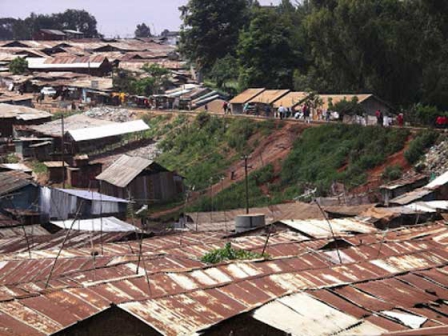
Kibera has one of the best boiled beans within Nairobi.
Yes, the kids in Kibera are sometimes dressed in tattered clothes. Yes, the buildings there are ramshackled. Yes, the clothes and food markets can be filthy at best and unnavigable at worst. Yes, the matatu touts are rowdy and potentially on some sort of local drug half the time. But Kibera has one of the best boiled beans the city has to offer. And the beans are served in paper bags.
On a Sunday, when worshippers are probably spending time at Nairobi Baptist, Nairobi Chapel, or other Nairobi churches, business goes on in Kibera. On the lane that leads to the Chief Magistrate’s Court, there’s almost everything being sold: vegetables, basins, airtime, water drums and cooked food.
The prices of items in Kibera are affordable, and they are hardly packaged and sold in large quantities, to be able to cater to its residents.
At about noon, at the gate of the Chief Magistrate’s Court, I stand. I’m watching these six-seven year old girls and boys, with their trousers and dresses covered in dirt, running around. They’re playing some game that probably has no name, or maybe it does, only known to them.
On the floor, surrounded and overlooked by this group running and playing around, are two girls, they are facing each other while seated on the ground. The girls have drawn some diagrams on the floor with pieces of charcoal. On one of the boxes, is an orange. It is half peeled. They are dividing the orange’s pieces between themselves as they eat with visible pleasure.
And then, they giggle, and laugh, and hi-five each other. And they giggle and laugh and repeat this pattern severally, for about 20 minutes. I find myself smiling, I have no idea why I’m smiling, but it’s probably because my sub-conscious is amused, and it’s wondering what these two young girls, seated on the streets, could possibly be so happy about.
So, dressed in black jeans and a T-shirt, I cross the road and go to sit beside them. I say hi. They say hi. They ask if I want an orange. I say I don’t, but what I want, is an answer to a question. They look at me. Actually, they stare. By this time we have a crowd forming, the kids who were playing earlier included in the crowd. One of the kids in the crowd asks: “Is it a hard question?” We all laugh. I say it isn’t. The girls look at me again, with smiles.
That’s my cue.
“Why are you so happy?”
Mishi (short for Michelle), seated to my right, says: “Kwa sababu ni Sunday na Sunday ni siku ya kuwa happy.”
(Because it’s a Sunday and Sundays are days to be happy.)
I’m silent.
The one on my left, Sherry (AKA Cheryl) then says: “Kwa sababu nacheza na rafiki yangu na tunaeza kula machungwa.”
(Because I’m playing with my friend and we get to eat an orange.)
The crowd as of now, made up of about 10 people, roars in laughter. And they clap, everyone claps. The girls blush.
Then Mishi, who is clearly the bolder one of the two, says: “Madam?”
“Yes?” I respond.
“Na wewe uko happy?”
(How about you, are you happy?)
The crowd falls quiet. Kibera too, falls quiet. Even amidst the blowing of horns from over-ambitious matatus, in this very moment, Kibera did feel quiet.
I look at the kids and say: “Yes, I’m very happy.”
“Why are you happy?” Sherry asks, working on a piece of the orange.
I say: “Because I get to sit here, on the road, and see you play and eat an orange. That makes me happy.”
“And tomorrow, will you be happy?” Mishi asks.
I, in turn ask, “Do you think I’ll be happy tomorrow?”
And she says: “Ukibuy zile beans zime-boiliwa za thirty bob, halafu upike, eh, utakua happy tu sana.”
(If you buy the boiled beans worth 30 Shillings, and cook them, you’ll be very happy.)
Laughter erupts.
I get up, and shake their hands. Their hands are sticky, but they are the sticky hands of children who are eating and playing and happy on the streets of Nairobi on a Sunday.
I ask for a photo but they say they don’t really care for photos. They, instead, would like more oranges. (These are girls who will grow up to be business-savvy women!)
I buy them oranges. And I buy myself boiled beans worth 30 Shilings, because I want to be happy tomorrow.
So here’s a question: are you happy? If not, go grab yourself some boiled beans from Kibera, you might just get some perspective. And no, you middle-class snob, you won’t die. Really, you won’t.
Yvonne Aoll is a writer and freelance journalist. You can read more of her work here http://www.cottageaoll.com/
 The Standard Group Plc is a multi-media organization with investments in media
platforms spanning newspaper print
operations, television, radio broadcasting, digital and online services. The
Standard Group is recognized as a
leading multi-media house in Kenya with a key influence in matters of national and
international interest.
The Standard Group Plc is a multi-media organization with investments in media
platforms spanning newspaper print
operations, television, radio broadcasting, digital and online services. The
Standard Group is recognized as a
leading multi-media house in Kenya with a key influence in matters of national and
international interest.
